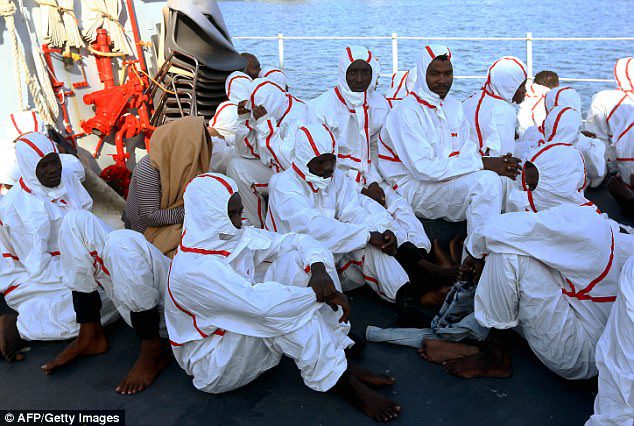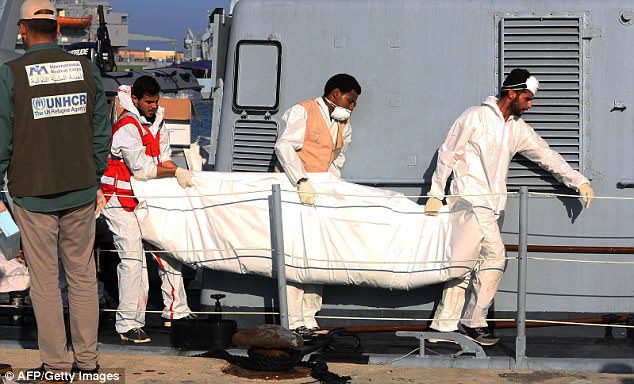“Thirty-one migrants died and 200 were rescued after they were eaten by sharks during a perilous crossing from Africa to Italy,” Libya’s Navy has said. Among the dead were 18 women and three children, while 40 people were still missing.
Libyan Coast Guard boats arrived at the scene and spotted large blue sharks swimming around the boat.

African migrants are seen aboard a rescue ship as they arrive at a naval base in Tripoli on November 25, 2017, after their rubber boat was rescued off the coast of Garabulli
‘When we arrived in the area, off the town of Garabulli, [one] dinghy was semi-submerged and still had 44 people clinging on to it, whom we saved,’ Libyan patrol boat commander Nasser al-Ghammoudi said.
‘There were lots of bodies all around and we saw there were four or five sharks swimming among them, large blue sharks, a very aggressive species.’
‘When we brought the bodies on board we noticed that some of them had been bitten, so it’s possible that among the missing some may have been eaten.’
Two rescue operations were conducted off the coast of Garabulli, 40 miles east of Tripoli, Libya’s navy said. The rescued were brought to a naval base in Tripoli where they were given water, food, and medical care.
Spokesman Colonel Abu Ajila Abdelbarri said that patrols found 31 bodies and 60 survivors from one boat, while all 140 passengers survived in the second boat.

Libyan coastguards carry the body of an African migrant at a naval base in the capital Tripoli
He said: ‘When we arrived at the spot, we found an inflatable dinghy with several people clinging to part of it.’
Migrants from Somalia, Ghana, Ethiopia, Nigeria and four from Pakistan were among those rescued.
‘One of the vessels was three-quarters under water when the coastguard arrived,’ Al-Ghammoudi said.
He added: ‘We looked for other survivors for more than five hours. We were able to rescue one woman after we heard her shouts.’
Mild weather and calm seas have led to a rise in the number of migrant journeys from Libya to Europe. More than 400 people were rescued from a stricken wooden boat further off the Libyan coast.
Italy’s coastguard coordinates the rescue effort in international waters, reported that 1,500 had been saved in only two days.
On Thursday, the UN put the number of arrivals at Italian ports in the previous three months at 21,666. The lowest total registered in four years for that time of the year.
The trend has been attributed to a controversial combination of an Italian-led boosting of the Libyan coastguard’s ability to intercept boats and efforts to enlist the help of powerful militias to curb traffickers’ activity.
There have been moves to tighten Libya’s southern borders, accelerate repatriations directly from Libya, and measures to stem the flow of migrants from sub-Saharan Africa through transit states such as Niger and Sudan.
If you know someone who might like this, please click “Share!”!
